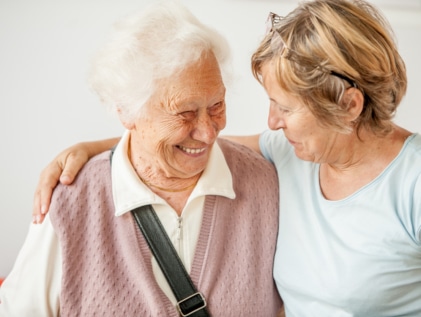Though we may not want to admit it, fall has officially settled in, and the days are getting cooler and shorter. While many people look forward to the sounds, sights, and smells of autumn, the coming months can put older adults at higher risk of injury and illness. It’s essential at this time of year that seniors and their loved ones ensure that they are prepared for colder temperatures and safeguard their physical well-being in the coming months.
Help your loved one stay happy and healthy this fall with these helpful suggestions:
Stay Covid-19 and Flu Free
Seniors are more susceptible to the flu and coronavirus due to their weakening immune system or if they have pre-existing health conditions. There are several steps that seniors should take to stay healthy this fall and into the winter:
- Stay home as much as possible and avoid spending extended periods of time in public places
- Get the flu vaccine. Geriatric physicians recommend seniors get the high dose flu vaccine
- Get the Covid-19 vaccine. The CDC states that people over sixty-five who are fully vaccinated showed a 94% reduced risk of Covid-19 related hospitalization.
- Wash hands often and use hand sanitizer
- Eat a healthy and varied diet to support a strong immune system
- Get regular exercise. Exercise improves the function of white blood cells, which fight infection and improve the immune system.
Clean Out and Re-stock the Medicine Cabinet
The fall is the perfect time to organize medicine cabinets and get them fully stocked before winter sets in. Sort through medication, throwing out expired meds, and keeping current prescriptions labeled and easy to locate. Stock up on flu and Covid-19 prevention items like hand sanitizer, antiseptic wipes, cold medications, vitamins, and supplements.
Keep Warm and Cozy
Older adults lose body heat faster than when they were younger and, with age, it may become more difficult to recognize signs that their body is cold. The risk of hypothermia is high for seniors over the age of sixty-five, and a dropping body temperature can cause problems like heart attack, kidney damage, and liver damage. To avoid hypothermia, seniors should spend most of their time indoors and keep the thermostat between 68- and 70-degrees Fahrenheit. Also, identify areas in the home that may be drafty and make sure to shut or seal them properly against the wind and cold.
Update Your Wardrobe
Take some time to go through your loved one’s wardrobe and take note of what they need for the fall months. It’s always a good idea for seniors to wear extra layers during the colder months and have good sturdy shoes, hats, scarves, and gloves on hand for particularly cold days. When staying home, seniors may want to consider wearing woolen socks and slippers, keeping extra blankets handy, and adding a layer of long underwear under pajamas and bathrobes.
If your loved one needs a bit more assistance and company, especially as we get farther into fall, a stay at a senior living community may be worth considering. Planning for the changing weather will ensure that your loved one stays happy, healthy, and safe.

